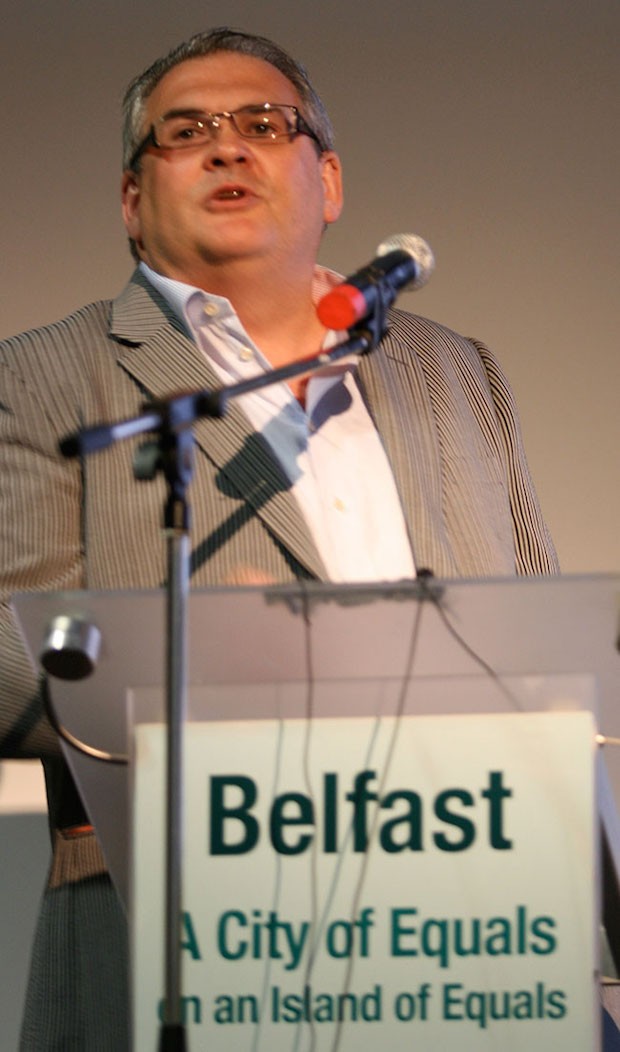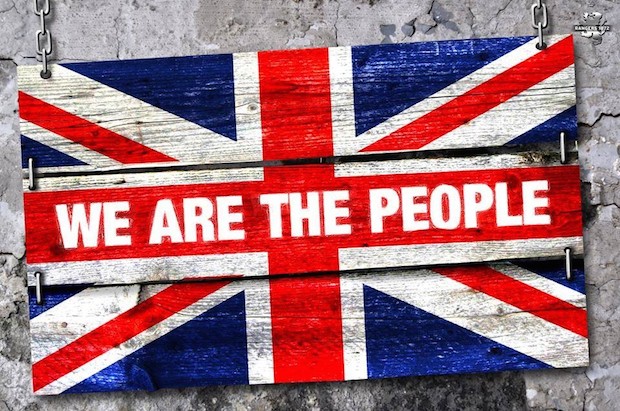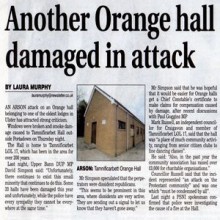30 November 2017
Our identities are not the problem, it’s how we practise them
Speech at the Sinn Fein Ard Fheis 2017 (17 & 18 November) by Professor Peter Shirlow, FAcSS, Irish Studies, University of Liverpool

‘As we were checking our tickets we realised we were to be seated in the Celtic end. This was problematic as my friend was wearing a Rangers top!’
I AM from a unionist background but I do not feel out of place. That is due to the fact that I have been welcomed.
An example of when I did feel out of place was when a friend and I were walking to Parkhead and as we were checking our tickets we realised we were to be seated in the Celtic end. This was problematic as my friend was wearing a Rangers top!
Fortunately, I had brought my coat, which I gave it to him. He very hurriedly put it on.
Unfortunately, he was at least four stone lighter and as we entered the ground he looked like a man who had turned up wearing a one-man tent.
We sat down as a public announcement declared that the club would take racism and sectarianism seriously and would eject offenders. They, the offenders, obviously knew they would not.
The announcement ended to a chorus from some – and I purposefully use the word some – Celtic fans proclaiming that they would rather be a Pakistani (not the word they used) than a Prod.
Some Rangers fans replied with The Billy Boy Song and the line concerning “being up to their knees in Catholic [not the word they used] blood”.
The Celtic fan beside me turned to me and said “those Rangers fans will never change”.
I replied: “Those Celtic fans who sang that racist song won’t either.”
“They are only having a laugh,” he proclaimed.
I never went back.

On the first day that my son started playing rugby at Malone, in east Belfast, the new parents were summoned to a meeting. A small, tough-looking man entered the room and introduced himself as the person in charge.
“There is only one rule in this club,” he declared. “If you are a sectarian bigot, racist or homophobe, get out! There’s the door.”
I decided to stay.
The person in charge was an ex-RUC man.
Ballymurphy to Linfield
 Around the same time, Paul McAreavey, from
Ballymurphy, signed for Linfield. As he was sitting drinking a pint in his
local, a man threw a bag in front of him. He opened it to find
thirty 10-pence pieces. Thirty pieces of silver was the price for which Judas
betrayed Jesus. How could crossing the sectarian divide be Judas-like?
Around the same time, Paul McAreavey, from
Ballymurphy, signed for Linfield. As he was sitting drinking a pint in his
local, a man threw a bag in front of him. He opened it to find
thirty 10-pence pieces. Thirty pieces of silver was the price for which Judas
betrayed Jesus. How could crossing the sectarian divide be Judas-like?
Paul McAreavey, as far as I know, is still a republican and a Celtic fan. That was not a problem for Linfield but it was a problem for the person who labelled him as Judas, who was also a republican and a Celtic fan.
With regard to sport and the challenge of sectarianism, I was recently involved in the following exchange.
Around the time of partition, my great-grandfather tried to form a trade union in a mill in Lisburn. He and a handful of the others, both Catholic and Protestant, were blacklisted by Catholic and Protestant employers.
My grandfather, his son, was harangued for standing up for a Catholic neighbour. It was during the year of her coronation. She was to pass by the labourer’s cottages were my family lived.
A bigot told my family’s neighbour that, as she was a Catholic, the Queen “wouldn’t want to see the likes of her”.
My grandfather seized him and pointed out that the woman’s two sons had fought (and I think one had died), ‘for King and Country’. He reminded him that his two sons had not signed up to fight fascism.
As a small boy, I remember my grandmother fretting when she heard of killings. She did not classify the dead. Her emotions of love and grace were universal and not selective.
Anti-sectarian but pro-Union
My own father would have cuffed my ears if I had thought or spoken in a sectarian fashion.
My forbearers were anti-sectarian but they were pro-Union. The idea that being pro-Union is inherently sectarian is not only wrong, it is inherently sectarian.
Sectarianism has two forms – prejudice and exclusiveness
Prejudice is the obvious form.
Sectarianism is vicious, insidious and repugnant. It is unjust and acrimonious. It is both within and without the groups that we belong to.
Sectarianism is not a natural state. We are not born sectarian.
One reason why people were pro-Union was – as recognised in your own Ard Fheis motion 154 – was due to the “South’s religious doctrine . . . alienating sections of the Protestant people”.
We must consider that we can be both sectarianised but not sectarian.
How could the treatment of Catholics in the North and Protestants in the South not make us suspicious of each other?
How could the violence of the past not make us fearful of each other?
The second form of sectarianism – one that we do not consider as much as the first – is exclusiveness.
We rarely consider it as it involves introspection and looking at ourselves.
Exclusiveness is the belief that the group you belong to is virtuous, righteous and authentic. The very idea that your identity and its related actions are beyond reproach is sectarian. That superiority complex is sectarian.
A republican recently told me: “We are the beautiful people.” Given that beauty is relative, I asked: “Who are the ugly people?” His face read like a man who had not really thought his comment out.

The exclusive position is attached to the belief that your opponents must be converted to your cause. Prejudice is the belief that all others are wrong. If your opponents are misguided, then that begs the question: what do they have to offer you? There is nothing that you have to offer your opponent, other than your claim that you are exceptional and they are flawed.
If your identity is non-negotiable and if it has no failings, then you will believe that you are stigma free. You will hear any challenge to your identity as an attempt to shame you. There will be no space to engage with constructive criticism. You will remain captured within the prison of your own superiority. You will speak and even shout but you will not hear. Regarding identity there is no such thing as splendid isolation.
Each day in Northern Ireland we perform a very harmful and destabilising ritual. What we know as ‘the politics of whataboutery’. We all know that Northern Ireland is a traumatised place. That trauma is reproduced with the turning on of the radio or the TV and hearing the daily row over ‘if you say that, I’ll say this’. If you say Bloody Sunday, I will say Bloody Friday; if you say McGurk’s Bar, I will say Kingsmill. We can scream ‘truth’ as we deny truth to others.
Of course, the issues around those events have not been resolved. But “a nation that keeps one eye on the past is wise. A nation that keeps two eyes on the past is blind.”
Being right about the past appears more important than healing, restoring or bringing about the stability required to end such retraumatisation. Convincing ‘the other side’ that they were wrong will not diminish their (or even your) suffering.
 We get caught up in the politics of
legitimacy as opposed to realising that much of our gut (our sectarianisation
if you will) exists because we have experienced the same events but
differently. Not because of our ideology per se but because the violence on our
doorstep came predominantly from ‘the other side’.
We get caught up in the politics of
legitimacy as opposed to realising that much of our gut (our sectarianisation
if you will) exists because we have experienced the same events but
differently. Not because of our ideology per se but because the violence on our
doorstep came predominantly from ‘the other side’.
What is anti-sectarianism?
The most important point about anti-sectarianism is that it stretches across the sectarian divide. In acknowledging that to be the case we then come to realise how artificial the sectarian divide is.
Throughout the conflict we had evidence on a near-daily basis of people proving that the sectarian divide was artificial. But we rarely or ever recognise that. We have silenced the narrative around those who, during the days of violence, aimed to maintain relationships across the sectarian divide.
People I know who lost loved ones received many letters from across the divide. I have read them and common phrases are:-
“This was not in my name.”
“I too lost a son but am from the other side. I know your pain.”
“This was senseless and unfair.”
One letter, sent to a woman in Ardoyne whose son was killed, began:
“I am a Protestant from the Shankill. I am proud of that and my Protestant faith but I never wanted anything to happen to your son or anyone’s son. I enclose a bible signed by members of our congregation.”
Here is a challenge to us all. Find those letters and give them power. Put them on gable ends, in our documents and on social media. If sectarianism has power, then giving power to these letters subverts that. Heaney’s assertion that hope and history had to rhyme for peace ignored the fact that it rhymed in those letters.
That brings us to what anti-sectarianism is and that is the creation of interdependence.
What is interdependence?
A non-sectarian society would uphold free association, tolerance and acceptance of difference. Paradoxically, a non-sectarian society would be one in which there are many sects, groups and types of identity. It would be a place of diversity and the site of parity of esteem.
Interdependence requires mutual reliance between groups. It aims to rupture ethnic seclusion. It challenges the idea that we as groups should remain independent from each other.
Ultimately, it challenges us to come out of that sense that our identity is independent of others.
.jpg) Anti-sectarianism elevates us from the idea
that our identity is self-sufficient. Because self-sufficiency rejects the fact
that many cultures have influence upon us. Ethnic seclusion is a form of
cultural smugness, never mind myth.
Anti-sectarianism elevates us from the idea
that our identity is self-sufficient. Because self-sufficiency rejects the fact
that many cultures have influence upon us. Ethnic seclusion is a form of
cultural smugness, never mind myth.
Here is an example of interdependence.
I as someone who has a different identity to you would not write your motion in the way that you did. I would have framed it differently. But I support its aims. Knowing that we are saying the same thing but differently is important, but what is more important is our recognition that we can only challenge sectarianism together.
Challenging through knowledge
Maybe we should understand that the cultures of Irish and Ulster-Scots are more intertwined than we assume.
When I first went to university I was sitting with two friends. The unionist goes: “Who will we vote for in the student elections? Ainny or Grainny?”
A friend, who was a republican from Lurgan, said: “I think you mean Gráinne and Áine.”
To judge our lack of knowledge as prejudice is wrong. It was simply a lack of acquaintanceship. That was a shameful event for me. Not that I didn’t know Irish but that I was corrected by someone from Lurgan.
In recent research regarding the electorate in Northern Ireland, the presentation of our findings served to remind us of the identity trap. One of the findings that related to marriage equality was that the majority of those who described themselves as Protestants were supportive.
 Moreover, the share of those who supported marriage equality and
voted DUP had grown to around 40%. A DUP member told me that was “nonsense” and
a Sinn Féin member, in a style reminiscent of Victor Mildrew announced:
“I don’t believe it!”
Moreover, the share of those who supported marriage equality and
voted DUP had grown to around 40%. A DUP member told me that was “nonsense” and
a Sinn Féin member, in a style reminiscent of Victor Mildrew announced:
“I don’t believe it!”
That research also shows that Protestants under the age of 40 and those who do not vote are firmly pro-Union. That group are more pro-choice, more likely to not be offended by a relative marrying across the sectarian divide and more supportive of integrated education than Sinn Féin voters.
If that comes as a shock to you, ask yourself why.
If we are truly supportive of conflict transformation then we need to accept that the end result is not that we change our identities. We need to realise that our identities are not the problem but how we practise them.
If we do not hear what we are being told because if does not fit our narrative of who we are, then we are being thoughtless.
If we do not accept that we must hear things about us that are painful and uncomfortable, then we will remain in a perpetual state of sectarianised fear.
The gut will forever rule the mind.
If sectarianism is built on prejudice it will wilt upon the demise of bigotry.
I will end on the following.
“The importance of moving towards a society where there is respect and understanding of each other’s traditions cannot be stressed enough.
“Differences in our society must cease to be barriers. Difference must be recognised and appreciated and celebrated.
“I believe this is a tremendous time in our history. A time of opportunity – if grasped. Not to do so would be foolish in the extreme.”
Those are not my words. They are those of Martin McGuinness.
Follow us on Facebook
An Phoblacht on Twitter
Uncomfortable Conversations

An initiative for dialogue
for reconciliation
— — — — — — —
Contributions from key figures in the churches, academia and wider civic society as well as senior republican figures





